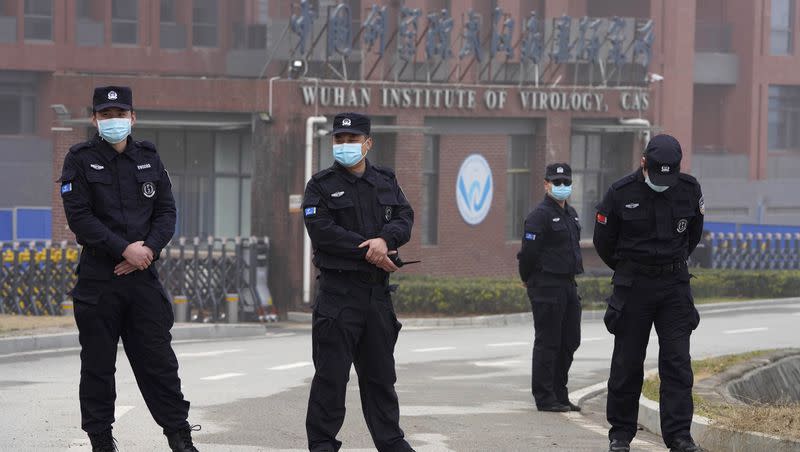Biden admin cuts funding to Wuhan lab. Stewart, Romney support move

- Oops!Something went wrong.Please try again later.
The Biden administration formally suspended funding for the Chinese lab at the center of the COVID-19 origin controversy in a move Rep. Chris Stewart says was long overdue.
“This was a complete no-brainer. It was apparent from the very beginning they should not have had funding,” Stewart said during a phone call with the Deseret News.
In a memo issued on Monday, a Department of Health and Human Services official notified the Wuhan Institute of Virology that it is now barred from participating in federal government funding programs for at least the next 10 years.
The determination was made after the lab refused to provide documentation establishing its safety practices in violation of a grant provided by the National Institutes of Health.
The Chinese facility has 30 days to respond to the memo.
“The NIH’s conclusion that WIV research likely violated protocols of the NIH regarding biosafety is undisputed,” the memo reads. “The immediate suspension of WIV is necessary to mitigate any potential public health risk.”
Between 2014 and 2020, the Wuhan lab received $1.4 million from the NIH and U.S. Agency for International Development, according to the Government Accountability Office. While the Wuhan Institute has not received research funding from the U.S. government since the Trump administration terminated a grant in 2020, Stewart says a formal suspension like the one issued this week was necessary to demonstrate the lab did not meet adequate safety standards.
“(It) was uncertain as long as there wasn’t an official policy put in place by the administration that they weren’t going to continue to fund them,” Stewart said. “I’m glad that the administration has finally put what was an obvious policy in place.”
Related
The origin of the COVID-19 virus is still unknown. However, one of the theories is that the virus originated in a lab studying bat coronaviruses located near Wuhan, China, the place where the COVID-19 pandemic appears to have begun.
Different branches of the U.S. intelligence community have come to varying, tentative conclusions about the origin of the virus. Both the Energy Department and FBI say the pandemic likely sprung from a lab leak scenario, while the National Intelligence Council, the CIA, and two other agencies, have taken the position that the virus probably emerged via natural transmission from an infected animal, The Wall Street Journal reported.
Stewart said his position on the House Permanent Select Committee on Intelligence has given him unique access to information surrounding the origins of the COVID-19 pandemic. In addition to technical facts about the nature of the virus, Stewart said additional evidence in support of the lab leak theory comes from China’s response to international investigations, which he says consisted of destroying important records and samples of viruses that had been worked on in the Wuhan lab.
“That makes no sense at all, unless they believe that the virus had come from their own lab,” Stewart said, adding that efforts to link the virus to a natural source have failed.
Despite its plausibility, the lab leak theory was quickly shot down by some federal agencies and media outlets in the early days of the pandemic, Stewart said.
“It’s not a conspiracy theory to ask that question. And yet, that’s exactly the way it was treated. We were treated as if we were nuts for even suggesting it,” Stewart said.
Last year, Stewart sponsored the Stop Adversarial Funding Expenditures for Laboratories Act, which he reintroduced this legislative term. The bill would “prohibit any head of a federal agency from providing assistance to the Wuhan Institute of Virology” as well as to any “country determined by the Secretary of State to be a foreign adversary, including China, Russia, North Korea, and Iran.”
Stewart said he’s fine to fund research that will allow the quicker development of vaccines, but said we “shouldn’t be funding that type of very risky endeavor with countries we don’t trust, that we can’t monitor what their security precautions are, what their processes are in the labs.”
On Tuesday, Sen. Mitt Romney introduced an expansive pandemic preparedness bill in the Senate that would, among other things, “cut off funding for research in China, particularly for gain-of-function research.”
Earlier this year, Sen. Mike Lee co-sponsored a bill that would require the Biden administration to declassify intelligence related to possible links between the Wuhan lab and the origins of the pandemic.
Stewart, whose 10 years in the House comes to an end this September, says “the single greatest concern” he has is the loss of trust among Americans in institutions, including health agencies like the NIH.
“Four years ago, no one thought ‘Those guys aren’t going to tell us the truth?’ Well, it turned out in some cases they didn’t,” Stewart said. “I just think we’ve got a real challenge and it’s going to take the government in a real deliberate way to try to rebuild that trust among the citizens.”

